BUS003 Developing Academic Skills: Time Management, Integrity, AU
VerifiedAdded on 2023/06/16
|18
|4059
|327
Portfolio
AI Summary
This portfolio focuses on developing essential academic skills, beginning with a demonstration of time management through a detailed study timetable that balances family time, work commitments, recreational activities, and dedicated study hours. A reflection on the effectiveness of the time management strategies, including the Pomodoro Technique and Gibbs reflection model, is provided. The portfolio identifies and evaluates key resources, such as Google Scholar, online journals, and textbooks, that support academic study. It also summarizes a book and an online article related to academic integrity, plagiarism, and referencing. Furthermore, the portfolio includes a discussion on the meaning of plagiarism and academic integrity, presented in the form of a leaflet. The aim is to enhance understanding and application of these crucial academic principles. Desklib offers a wealth of similar academic resources for students.
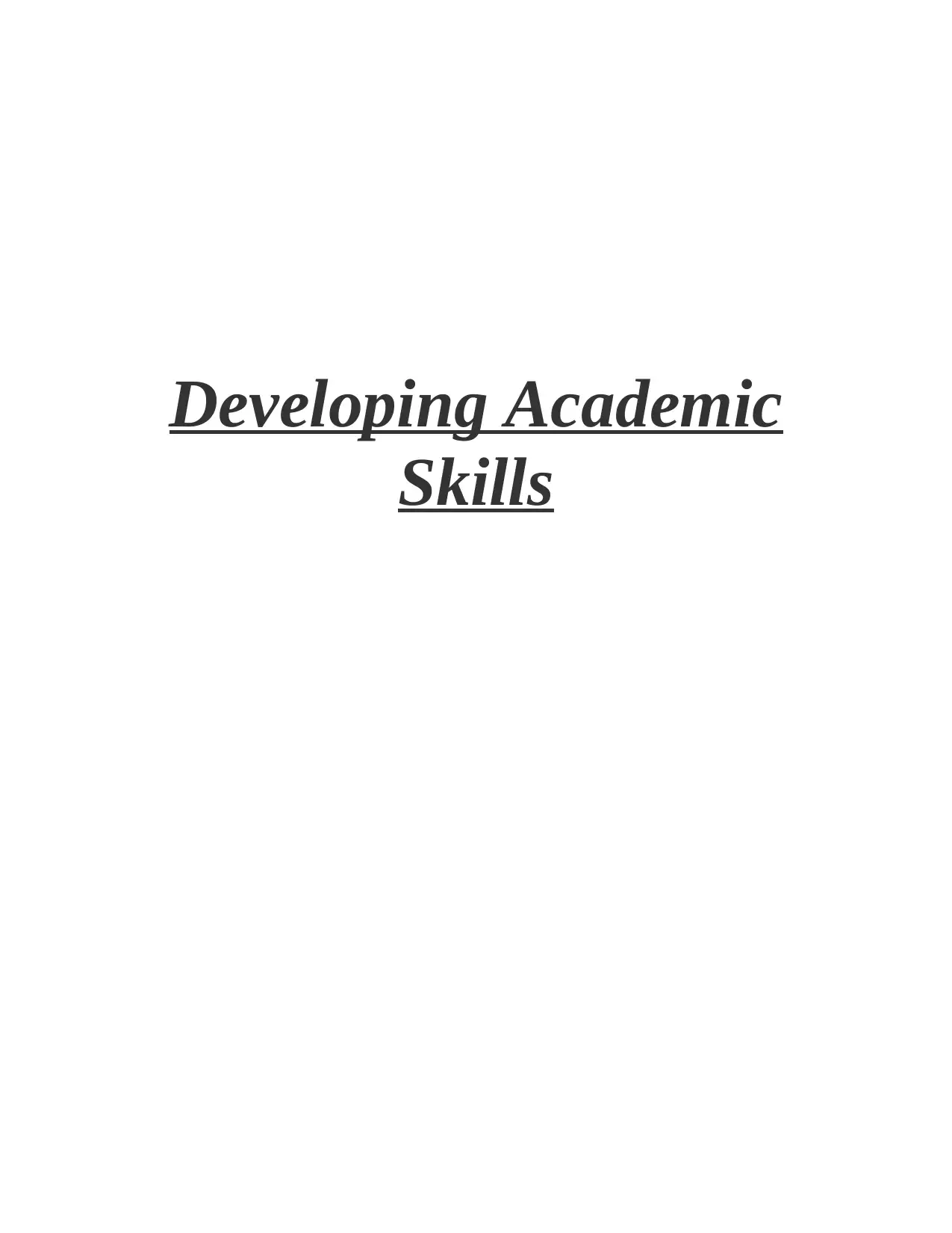
Developing Academic
Skills
Skills
Paraphrase This Document
Need a fresh take? Get an instant paraphrase of this document with our AI Paraphraser
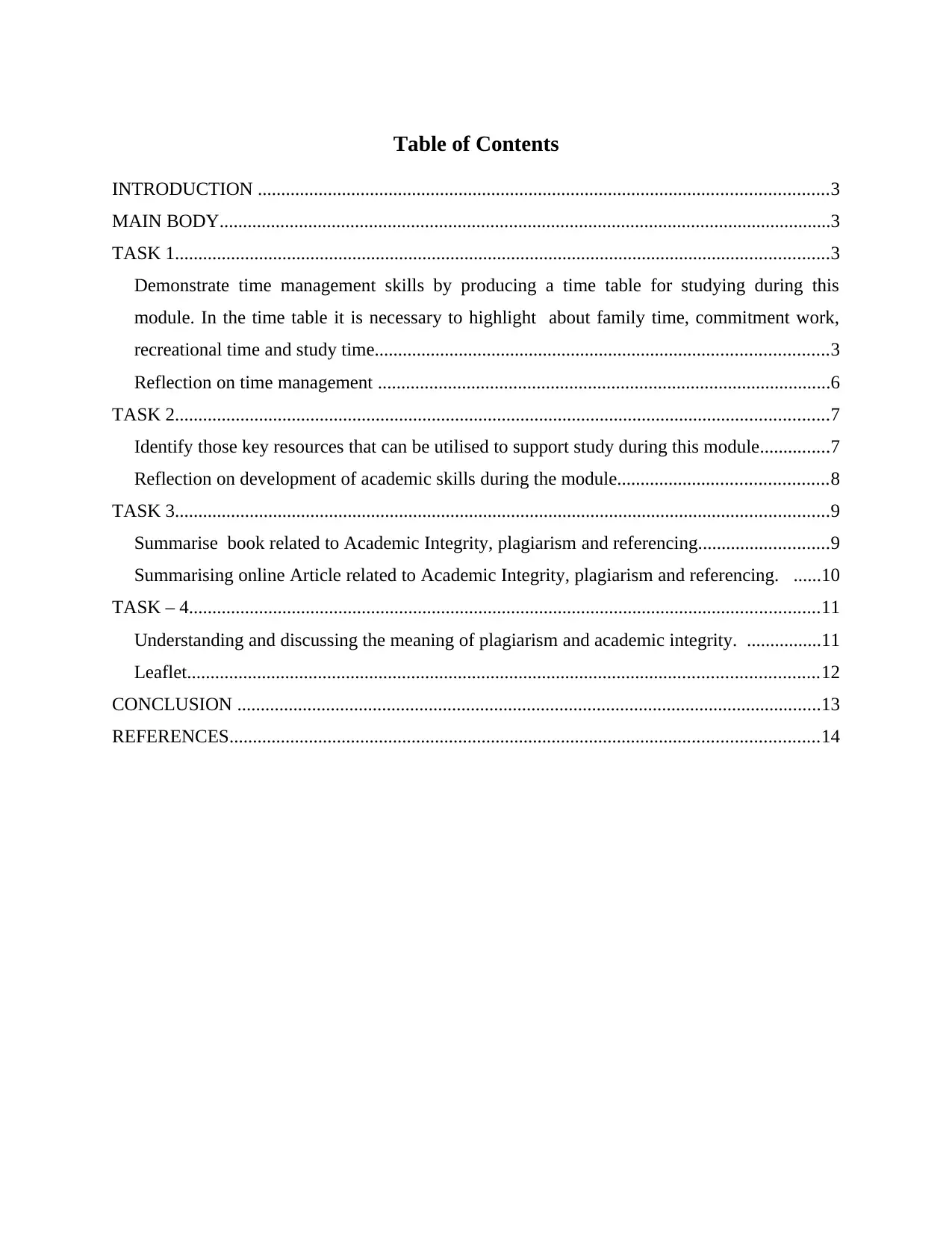
Table of Contents
INTRODUCTION ..........................................................................................................................3
MAIN BODY...................................................................................................................................3
TASK 1............................................................................................................................................3
Demonstrate time management skills by producing a time table for studying during this
module. In the time table it is necessary to highlight about family time, commitment work,
recreational time and study time.................................................................................................3
Reflection on time management .................................................................................................6
TASK 2............................................................................................................................................7
Identify those key resources that can be utilised to support study during this module...............7
Reflection on development of academic skills during the module.............................................8
TASK 3............................................................................................................................................9
Summarise book related to Academic Integrity, plagiarism and referencing............................9
Summarising online Article related to Academic Integrity, plagiarism and referencing. ......10
TASK – 4.......................................................................................................................................11
Understanding and discussing the meaning of plagiarism and academic integrity. ................11
Leaflet.......................................................................................................................................12
CONCLUSION .............................................................................................................................13
REFERENCES..............................................................................................................................14
INTRODUCTION ..........................................................................................................................3
MAIN BODY...................................................................................................................................3
TASK 1............................................................................................................................................3
Demonstrate time management skills by producing a time table for studying during this
module. In the time table it is necessary to highlight about family time, commitment work,
recreational time and study time.................................................................................................3
Reflection on time management .................................................................................................6
TASK 2............................................................................................................................................7
Identify those key resources that can be utilised to support study during this module...............7
Reflection on development of academic skills during the module.............................................8
TASK 3............................................................................................................................................9
Summarise book related to Academic Integrity, plagiarism and referencing............................9
Summarising online Article related to Academic Integrity, plagiarism and referencing. ......10
TASK – 4.......................................................................................................................................11
Understanding and discussing the meaning of plagiarism and academic integrity. ................11
Leaflet.......................................................................................................................................12
CONCLUSION .............................................................................................................................13
REFERENCES..............................................................................................................................14
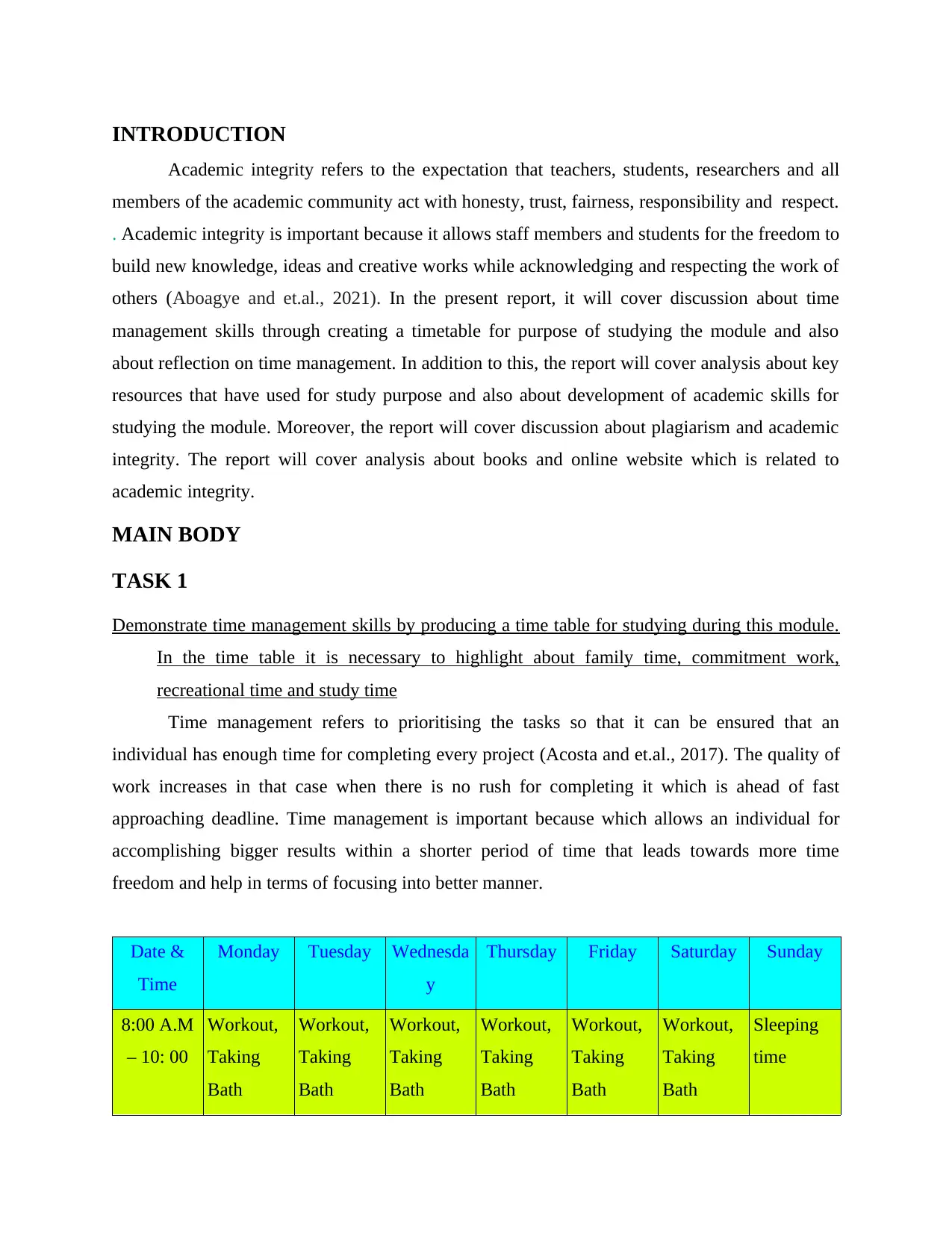
INTRODUCTION
Academic integrity refers to the expectation that teachers, students, researchers and all
members of the academic community act with honesty, trust, fairness, responsibility and respect.
. Academic integrity is important because it allows staff members and students for the freedom to
build new knowledge, ideas and creative works while acknowledging and respecting the work of
others (Aboagye and et.al., 2021). In the present report, it will cover discussion about time
management skills through creating a timetable for purpose of studying the module and also
about reflection on time management. In addition to this, the report will cover analysis about key
resources that have used for study purpose and also about development of academic skills for
studying the module. Moreover, the report will cover discussion about plagiarism and academic
integrity. The report will cover analysis about books and online website which is related to
academic integrity.
MAIN BODY
TASK 1
Demonstrate time management skills by producing a time table for studying during this module.
In the time table it is necessary to highlight about family time, commitment work,
recreational time and study time
Time management refers to prioritising the tasks so that it can be ensured that an
individual has enough time for completing every project (Acosta and et.al., 2017). The quality of
work increases in that case when there is no rush for completing it which is ahead of fast
approaching deadline. Time management is important because which allows an individual for
accomplishing bigger results within a shorter period of time that leads towards more time
freedom and help in terms of focusing into better manner.
Date &
Time
Monday Tuesday Wednesda
y
Thursday Friday Saturday Sunday
8:00 A.M
– 10: 00
Workout,
Taking
Bath
Workout,
Taking
Bath
Workout,
Taking
Bath
Workout,
Taking
Bath
Workout,
Taking
Bath
Workout,
Taking
Bath
Sleeping
time
Academic integrity refers to the expectation that teachers, students, researchers and all
members of the academic community act with honesty, trust, fairness, responsibility and respect.
. Academic integrity is important because it allows staff members and students for the freedom to
build new knowledge, ideas and creative works while acknowledging and respecting the work of
others (Aboagye and et.al., 2021). In the present report, it will cover discussion about time
management skills through creating a timetable for purpose of studying the module and also
about reflection on time management. In addition to this, the report will cover analysis about key
resources that have used for study purpose and also about development of academic skills for
studying the module. Moreover, the report will cover discussion about plagiarism and academic
integrity. The report will cover analysis about books and online website which is related to
academic integrity.
MAIN BODY
TASK 1
Demonstrate time management skills by producing a time table for studying during this module.
In the time table it is necessary to highlight about family time, commitment work,
recreational time and study time
Time management refers to prioritising the tasks so that it can be ensured that an
individual has enough time for completing every project (Acosta and et.al., 2017). The quality of
work increases in that case when there is no rush for completing it which is ahead of fast
approaching deadline. Time management is important because which allows an individual for
accomplishing bigger results within a shorter period of time that leads towards more time
freedom and help in terms of focusing into better manner.
Date &
Time
Monday Tuesday Wednesda
y
Thursday Friday Saturday Sunday
8:00 A.M
– 10: 00
Workout,
Taking
Bath
Workout,
Taking
Bath
Workout,
Taking
Bath
Workout,
Taking
Bath
Workout,
Taking
Bath
Workout,
Taking
Bath
Sleeping
time
⊘ This is a preview!⊘
Do you want full access?
Subscribe today to unlock all pages.

Trusted by 1+ million students worldwide
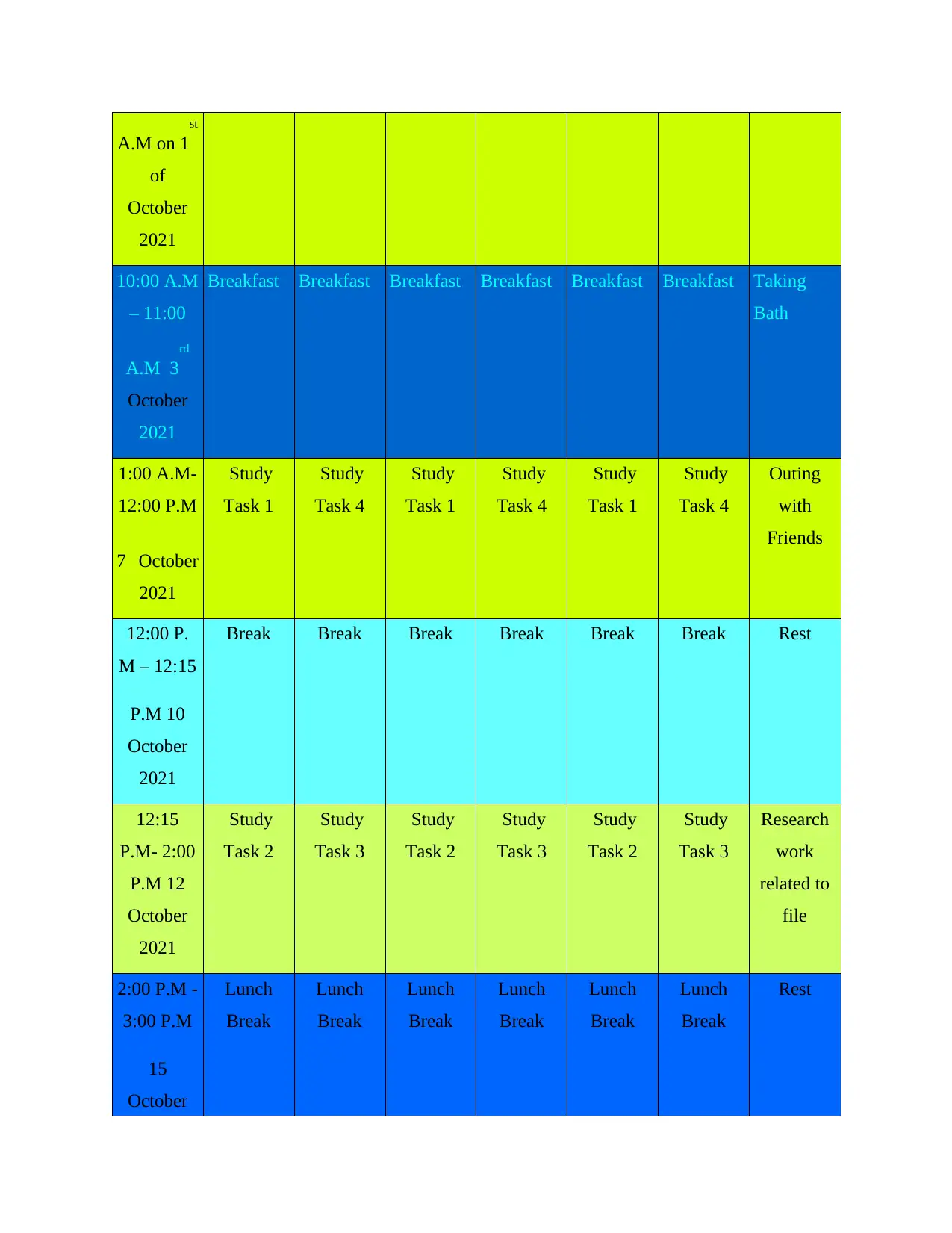
A.M on 1
st
of
October
2021
10:00 A.M
– 11:00
A.M 3
rd
October
2021
Breakfast Breakfast Breakfast Breakfast Breakfast Breakfast Taking
Bath
1:00 A.M-
12:00 P.M
7 October
2021
Study
Task 1
Study
Task 4
Study
Task 1
Study
Task 4
Study
Task 1
Study
Task 4
Outing
with
Friends
12:00 P.
M – 12:15
P.M 10
October
2021
Break Break Break Break Break Break Rest
12:15
P.M- 2:00
P.M 12
October
2021
Study
Task 2
Study
Task 3
Study
Task 2
Study
Task 3
Study
Task 2
Study
Task 3
Research
work
related to
file
2:00 P.M -
3:00 P.M
15
October
Lunch
Break
Lunch
Break
Lunch
Break
Lunch
Break
Lunch
Break
Lunch
Break
Rest
st
of
October
2021
10:00 A.M
– 11:00
A.M 3
rd
October
2021
Breakfast Breakfast Breakfast Breakfast Breakfast Breakfast Taking
Bath
1:00 A.M-
12:00 P.M
7 October
2021
Study
Task 1
Study
Task 4
Study
Task 1
Study
Task 4
Study
Task 1
Study
Task 4
Outing
with
Friends
12:00 P.
M – 12:15
P.M 10
October
2021
Break Break Break Break Break Break Rest
12:15
P.M- 2:00
P.M 12
October
2021
Study
Task 2
Study
Task 3
Study
Task 2
Study
Task 3
Study
Task 2
Study
Task 3
Research
work
related to
file
2:00 P.M -
3:00 P.M
15
October
Lunch
Break
Lunch
Break
Lunch
Break
Lunch
Break
Lunch
Break
Lunch
Break
Rest
Paraphrase This Document
Need a fresh take? Get an instant paraphrase of this document with our AI Paraphraser
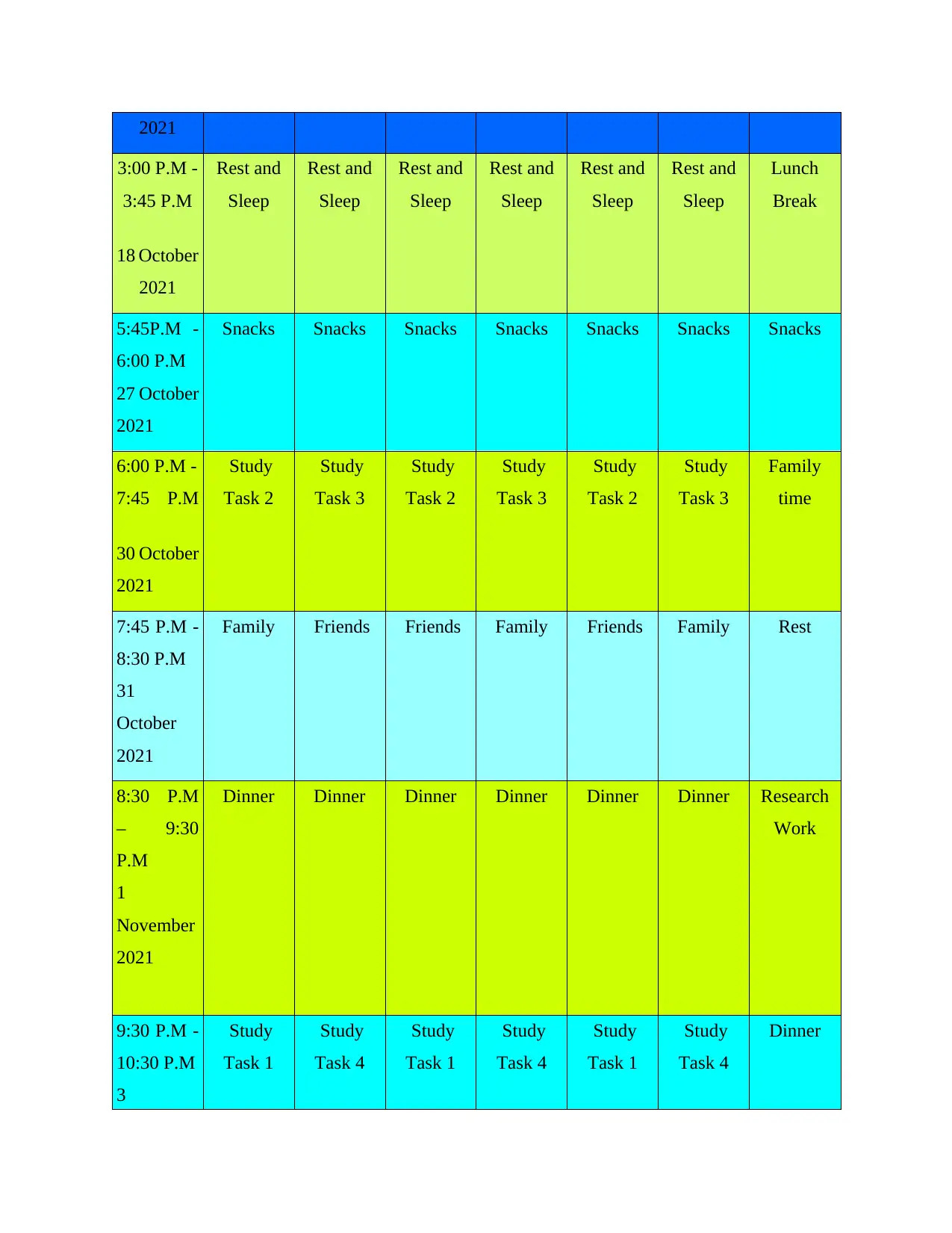
2021
3:00 P.M -
3:45 P.M
18 October
2021
Rest and
Sleep
Rest and
Sleep
Rest and
Sleep
Rest and
Sleep
Rest and
Sleep
Rest and
Sleep
Lunch
Break
5:45P.M -
6:00 P.M
27 October
2021
Snacks Snacks Snacks Snacks Snacks Snacks Snacks
6:00 P.M -
7:45 P.M
30 October
2021
Study
Task 2
Study
Task 3
Study
Task 2
Study
Task 3
Study
Task 2
Study
Task 3
Family
time
7:45 P.M -
8:30 P.M
31
October
2021
Family Friends Friends Family Friends Family Rest
8:30 P.M
– 9:30
P.M
1
November
2021
Dinner Dinner Dinner Dinner Dinner Dinner Research
Work
9:30 P.M -
10:30 P.M
3
Study
Task 1
Study
Task 4
Study
Task 1
Study
Task 4
Study
Task 1
Study
Task 4
Dinner
3:00 P.M -
3:45 P.M
18 October
2021
Rest and
Sleep
Rest and
Sleep
Rest and
Sleep
Rest and
Sleep
Rest and
Sleep
Rest and
Sleep
Lunch
Break
5:45P.M -
6:00 P.M
27 October
2021
Snacks Snacks Snacks Snacks Snacks Snacks Snacks
6:00 P.M -
7:45 P.M
30 October
2021
Study
Task 2
Study
Task 3
Study
Task 2
Study
Task 3
Study
Task 2
Study
Task 3
Family
time
7:45 P.M -
8:30 P.M
31
October
2021
Family Friends Friends Family Friends Family Rest
8:30 P.M
– 9:30
P.M
1
November
2021
Dinner Dinner Dinner Dinner Dinner Dinner Research
Work
9:30 P.M -
10:30 P.M
3
Study
Task 1
Study
Task 4
Study
Task 1
Study
Task 4
Study
Task 1
Study
Task 4
Dinner
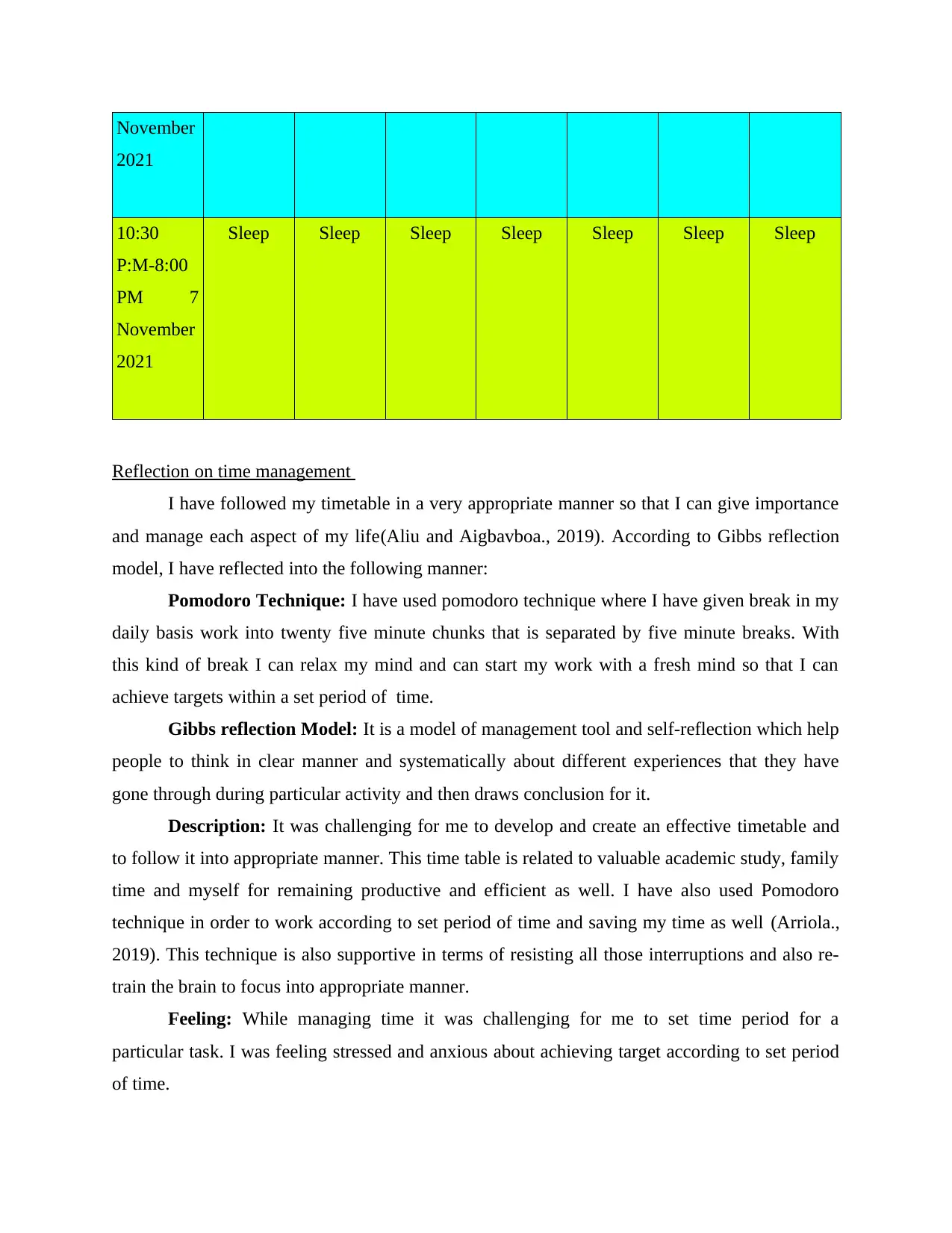
November
2021
10:30
P:M-8:00
PM 7
November
2021
Sleep Sleep Sleep Sleep Sleep Sleep Sleep
Reflection on time management
I have followed my timetable in a very appropriate manner so that I can give importance
and manage each aspect of my life(Aliu and Aigbavboa., 2019). According to Gibbs reflection
model, I have reflected into the following manner:
Pomodoro Technique: I have used pomodoro technique where I have given break in my
daily basis work into twenty five minute chunks that is separated by five minute breaks. With
this kind of break I can relax my mind and can start my work with a fresh mind so that I can
achieve targets within a set period of time.
Gibbs reflection Model: It is a model of management tool and self-reflection which help
people to think in clear manner and systematically about different experiences that they have
gone through during particular activity and then draws conclusion for it.
Description: It was challenging for me to develop and create an effective timetable and
to follow it into appropriate manner. This time table is related to valuable academic study, family
time and myself for remaining productive and efficient as well. I have also used Pomodoro
technique in order to work according to set period of time and saving my time as well (Arriola.,
2019). This technique is also supportive in terms of resisting all those interruptions and also re-
train the brain to focus into appropriate manner.
Feeling: While managing time it was challenging for me to set time period for a
particular task. I was feeling stressed and anxious about achieving target according to set period
of time.
2021
10:30
P:M-8:00
PM 7
November
2021
Sleep Sleep Sleep Sleep Sleep Sleep Sleep
Reflection on time management
I have followed my timetable in a very appropriate manner so that I can give importance
and manage each aspect of my life(Aliu and Aigbavboa., 2019). According to Gibbs reflection
model, I have reflected into the following manner:
Pomodoro Technique: I have used pomodoro technique where I have given break in my
daily basis work into twenty five minute chunks that is separated by five minute breaks. With
this kind of break I can relax my mind and can start my work with a fresh mind so that I can
achieve targets within a set period of time.
Gibbs reflection Model: It is a model of management tool and self-reflection which help
people to think in clear manner and systematically about different experiences that they have
gone through during particular activity and then draws conclusion for it.
Description: It was challenging for me to develop and create an effective timetable and
to follow it into appropriate manner. This time table is related to valuable academic study, family
time and myself for remaining productive and efficient as well. I have also used Pomodoro
technique in order to work according to set period of time and saving my time as well (Arriola.,
2019). This technique is also supportive in terms of resisting all those interruptions and also re-
train the brain to focus into appropriate manner.
Feeling: While managing time it was challenging for me to set time period for a
particular task. I was feeling stressed and anxious about achieving target according to set period
of time.
⊘ This is a preview!⊘
Do you want full access?
Subscribe today to unlock all pages.

Trusted by 1+ million students worldwide
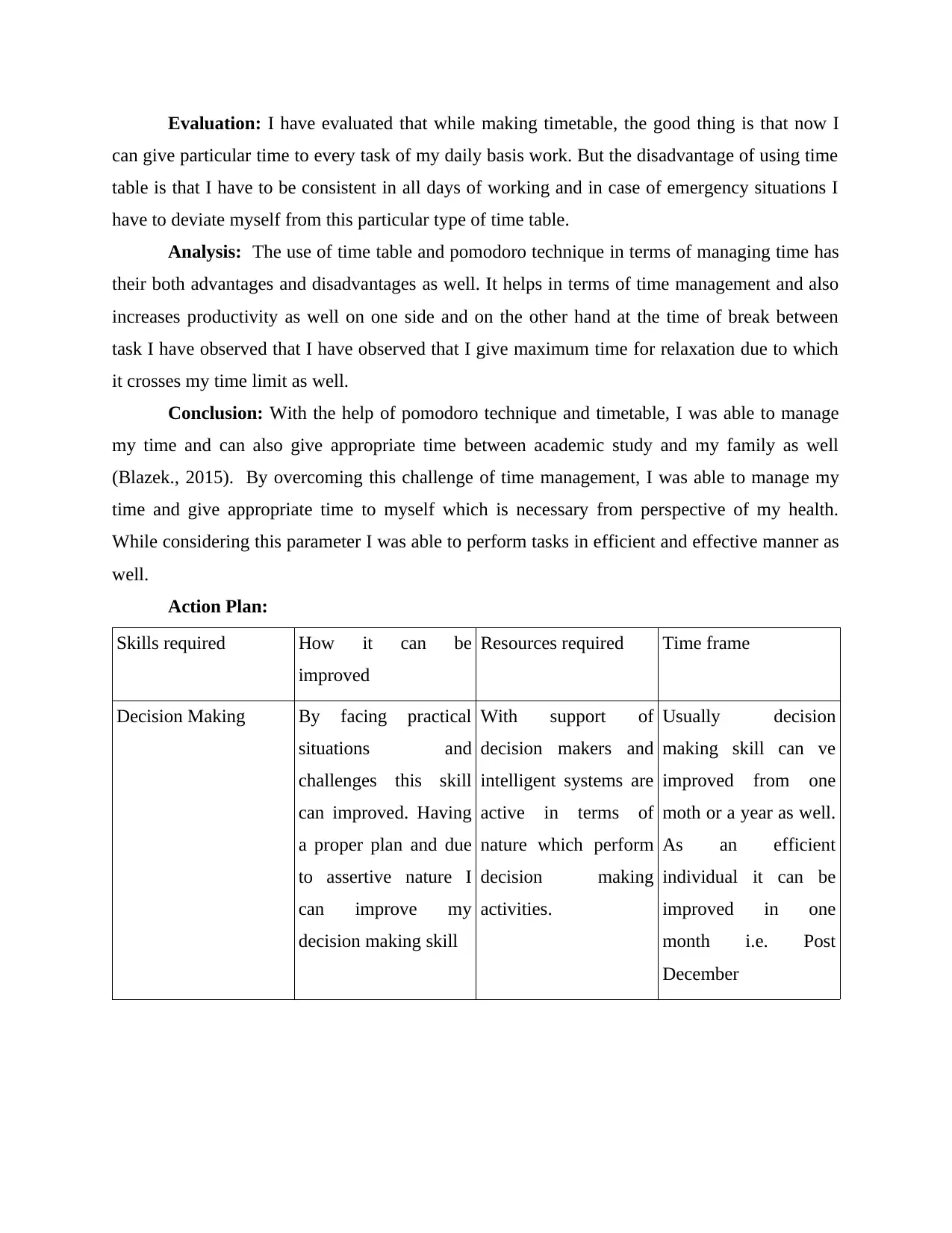
Evaluation: I have evaluated that while making timetable, the good thing is that now I
can give particular time to every task of my daily basis work. But the disadvantage of using time
table is that I have to be consistent in all days of working and in case of emergency situations I
have to deviate myself from this particular type of time table.
Analysis: The use of time table and pomodoro technique in terms of managing time has
their both advantages and disadvantages as well. It helps in terms of time management and also
increases productivity as well on one side and on the other hand at the time of break between
task I have observed that I have observed that I give maximum time for relaxation due to which
it crosses my time limit as well.
Conclusion: With the help of pomodoro technique and timetable, I was able to manage
my time and can also give appropriate time between academic study and my family as well
(Blazek., 2015). By overcoming this challenge of time management, I was able to manage my
time and give appropriate time to myself which is necessary from perspective of my health.
While considering this parameter I was able to perform tasks in efficient and effective manner as
well.
Action Plan:
Skills required How it can be
improved
Resources required Time frame
Decision Making By facing practical
situations and
challenges this skill
can improved. Having
a proper plan and due
to assertive nature I
can improve my
decision making skill
With support of
decision makers and
intelligent systems are
active in terms of
nature which perform
decision making
activities.
Usually decision
making skill can ve
improved from one
moth or a year as well.
As an efficient
individual it can be
improved in one
month i.e. Post
December
can give particular time to every task of my daily basis work. But the disadvantage of using time
table is that I have to be consistent in all days of working and in case of emergency situations I
have to deviate myself from this particular type of time table.
Analysis: The use of time table and pomodoro technique in terms of managing time has
their both advantages and disadvantages as well. It helps in terms of time management and also
increases productivity as well on one side and on the other hand at the time of break between
task I have observed that I have observed that I give maximum time for relaxation due to which
it crosses my time limit as well.
Conclusion: With the help of pomodoro technique and timetable, I was able to manage
my time and can also give appropriate time between academic study and my family as well
(Blazek., 2015). By overcoming this challenge of time management, I was able to manage my
time and give appropriate time to myself which is necessary from perspective of my health.
While considering this parameter I was able to perform tasks in efficient and effective manner as
well.
Action Plan:
Skills required How it can be
improved
Resources required Time frame
Decision Making By facing practical
situations and
challenges this skill
can improved. Having
a proper plan and due
to assertive nature I
can improve my
decision making skill
With support of
decision makers and
intelligent systems are
active in terms of
nature which perform
decision making
activities.
Usually decision
making skill can ve
improved from one
moth or a year as well.
As an efficient
individual it can be
improved in one
month i.e. Post
December
Paraphrase This Document
Need a fresh take? Get an instant paraphrase of this document with our AI Paraphraser
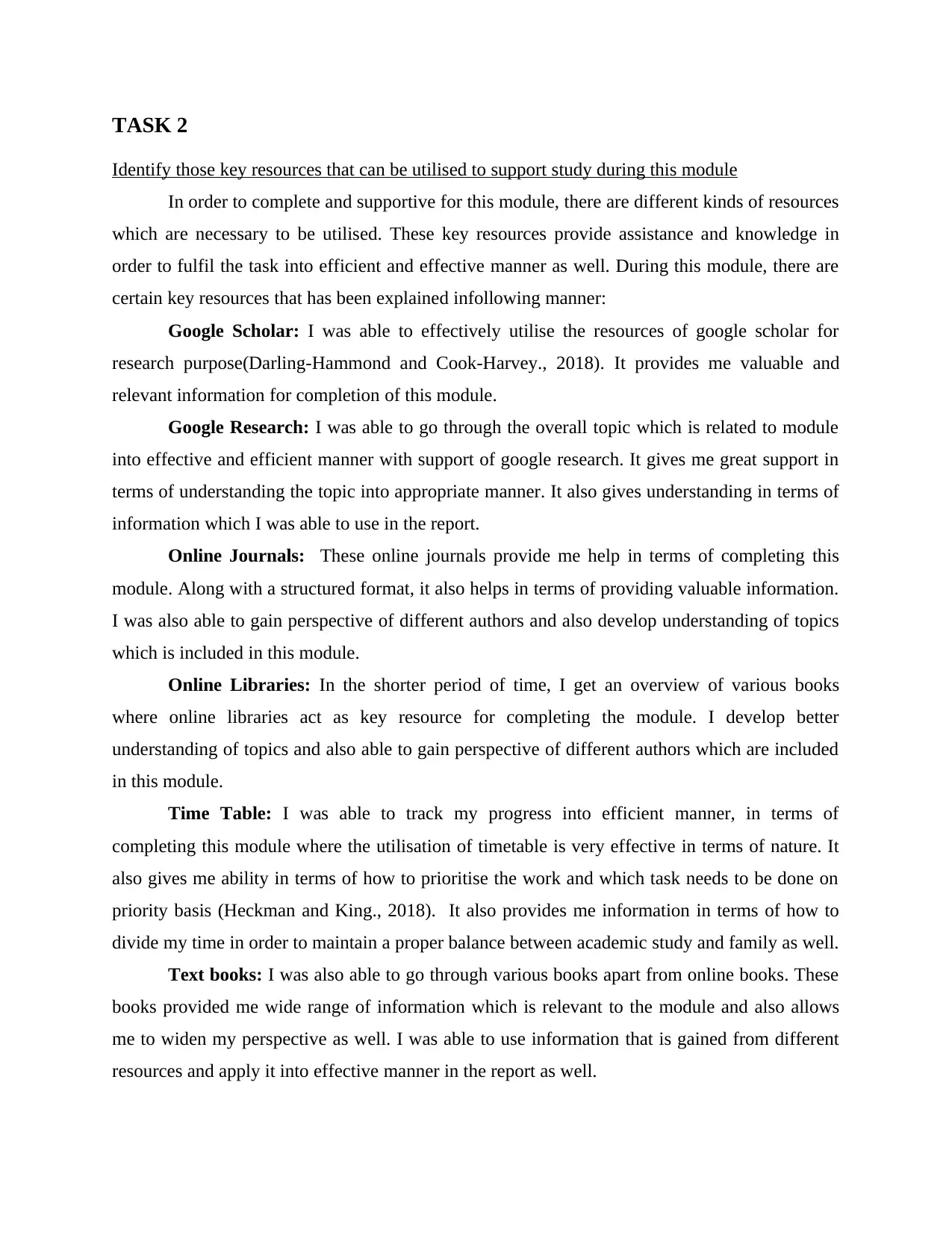
TASK 2
Identify those key resources that can be utilised to support study during this module
In order to complete and supportive for this module, there are different kinds of resources
which are necessary to be utilised. These key resources provide assistance and knowledge in
order to fulfil the task into efficient and effective manner as well. During this module, there are
certain key resources that has been explained infollowing manner:
Google Scholar: I was able to effectively utilise the resources of google scholar for
research purpose(Darling-Hammond and Cook-Harvey., 2018). It provides me valuable and
relevant information for completion of this module.
Google Research: I was able to go through the overall topic which is related to module
into effective and efficient manner with support of google research. It gives me great support in
terms of understanding the topic into appropriate manner. It also gives understanding in terms of
information which I was able to use in the report.
Online Journals: These online journals provide me help in terms of completing this
module. Along with a structured format, it also helps in terms of providing valuable information.
I was also able to gain perspective of different authors and also develop understanding of topics
which is included in this module.
Online Libraries: In the shorter period of time, I get an overview of various books
where online libraries act as key resource for completing the module. I develop better
understanding of topics and also able to gain perspective of different authors which are included
in this module.
Time Table: I was able to track my progress into efficient manner, in terms of
completing this module where the utilisation of timetable is very effective in terms of nature. It
also gives me ability in terms of how to prioritise the work and which task needs to be done on
priority basis (Heckman and King., 2018). It also provides me information in terms of how to
divide my time in order to maintain a proper balance between academic study and family as well.
Text books: I was also able to go through various books apart from online books. These
books provided me wide range of information which is relevant to the module and also allows
me to widen my perspective as well. I was able to use information that is gained from different
resources and apply it into effective manner in the report as well.
Identify those key resources that can be utilised to support study during this module
In order to complete and supportive for this module, there are different kinds of resources
which are necessary to be utilised. These key resources provide assistance and knowledge in
order to fulfil the task into efficient and effective manner as well. During this module, there are
certain key resources that has been explained infollowing manner:
Google Scholar: I was able to effectively utilise the resources of google scholar for
research purpose(Darling-Hammond and Cook-Harvey., 2018). It provides me valuable and
relevant information for completion of this module.
Google Research: I was able to go through the overall topic which is related to module
into effective and efficient manner with support of google research. It gives me great support in
terms of understanding the topic into appropriate manner. It also gives understanding in terms of
information which I was able to use in the report.
Online Journals: These online journals provide me help in terms of completing this
module. Along with a structured format, it also helps in terms of providing valuable information.
I was also able to gain perspective of different authors and also develop understanding of topics
which is included in this module.
Online Libraries: In the shorter period of time, I get an overview of various books
where online libraries act as key resource for completing the module. I develop better
understanding of topics and also able to gain perspective of different authors which are included
in this module.
Time Table: I was able to track my progress into efficient manner, in terms of
completing this module where the utilisation of timetable is very effective in terms of nature. It
also gives me ability in terms of how to prioritise the work and which task needs to be done on
priority basis (Heckman and King., 2018). It also provides me information in terms of how to
divide my time in order to maintain a proper balance between academic study and family as well.
Text books: I was also able to go through various books apart from online books. These
books provided me wide range of information which is relevant to the module and also allows
me to widen my perspective as well. I was able to use information that is gained from different
resources and apply it into effective manner in the report as well.
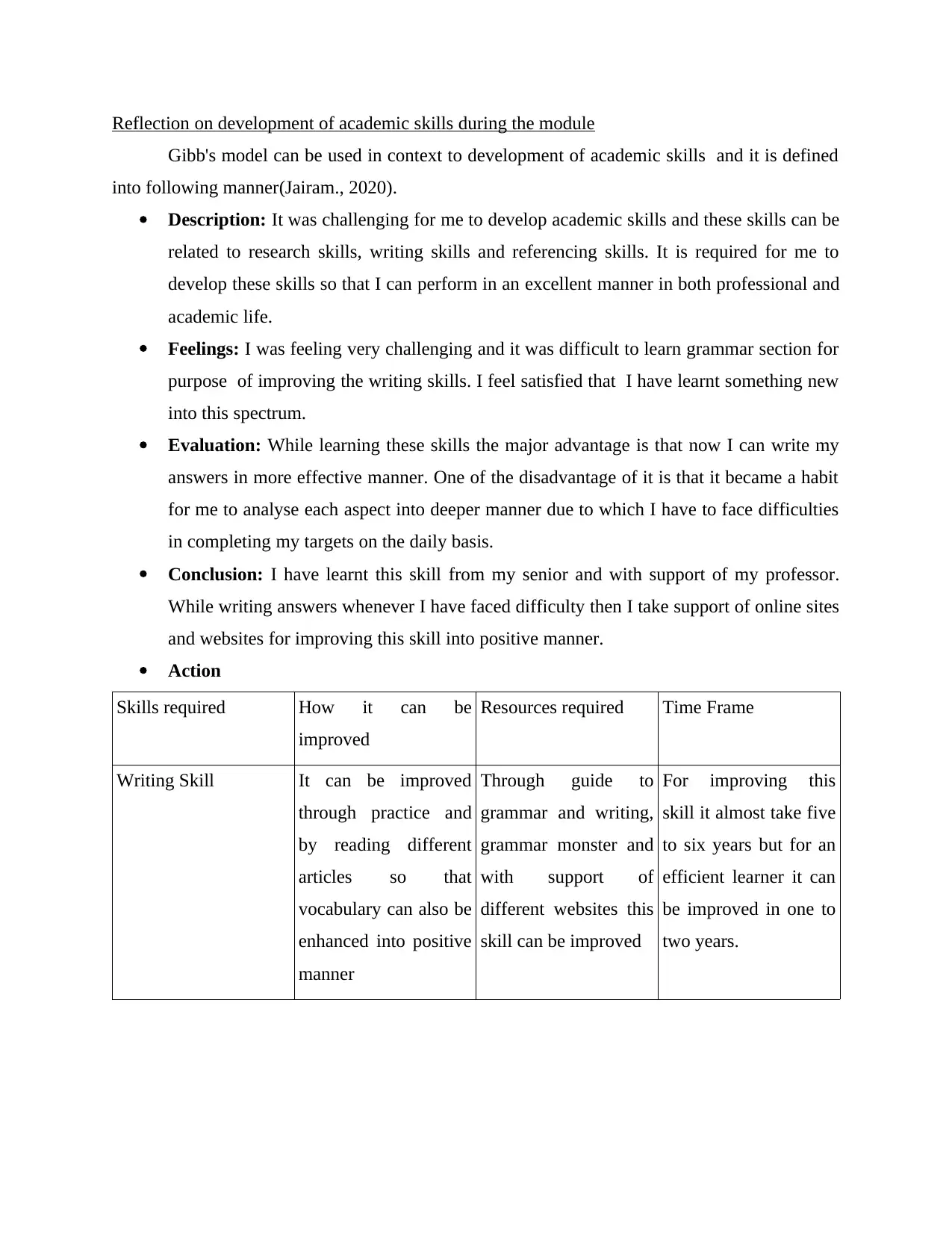
Reflection on development of academic skills during the module
Gibb's model can be used in context to development of academic skills and it is defined
into following manner(Jairam., 2020).
Description: It was challenging for me to develop academic skills and these skills can be
related to research skills, writing skills and referencing skills. It is required for me to
develop these skills so that I can perform in an excellent manner in both professional and
academic life.
Feelings: I was feeling very challenging and it was difficult to learn grammar section for
purpose of improving the writing skills. I feel satisfied that I have learnt something new
into this spectrum.
Evaluation: While learning these skills the major advantage is that now I can write my
answers in more effective manner. One of the disadvantage of it is that it became a habit
for me to analyse each aspect into deeper manner due to which I have to face difficulties
in completing my targets on the daily basis.
Conclusion: I have learnt this skill from my senior and with support of my professor.
While writing answers whenever I have faced difficulty then I take support of online sites
and websites for improving this skill into positive manner.
Action
Skills required How it can be
improved
Resources required Time Frame
Writing Skill It can be improved
through practice and
by reading different
articles so that
vocabulary can also be
enhanced into positive
manner
Through guide to
grammar and writing,
grammar monster and
with support of
different websites this
skill can be improved
For improving this
skill it almost take five
to six years but for an
efficient learner it can
be improved in one to
two years.
Gibb's model can be used in context to development of academic skills and it is defined
into following manner(Jairam., 2020).
Description: It was challenging for me to develop academic skills and these skills can be
related to research skills, writing skills and referencing skills. It is required for me to
develop these skills so that I can perform in an excellent manner in both professional and
academic life.
Feelings: I was feeling very challenging and it was difficult to learn grammar section for
purpose of improving the writing skills. I feel satisfied that I have learnt something new
into this spectrum.
Evaluation: While learning these skills the major advantage is that now I can write my
answers in more effective manner. One of the disadvantage of it is that it became a habit
for me to analyse each aspect into deeper manner due to which I have to face difficulties
in completing my targets on the daily basis.
Conclusion: I have learnt this skill from my senior and with support of my professor.
While writing answers whenever I have faced difficulty then I take support of online sites
and websites for improving this skill into positive manner.
Action
Skills required How it can be
improved
Resources required Time Frame
Writing Skill It can be improved
through practice and
by reading different
articles so that
vocabulary can also be
enhanced into positive
manner
Through guide to
grammar and writing,
grammar monster and
with support of
different websites this
skill can be improved
For improving this
skill it almost take five
to six years but for an
efficient learner it can
be improved in one to
two years.
⊘ This is a preview!⊘
Do you want full access?
Subscribe today to unlock all pages.

Trusted by 1+ million students worldwide
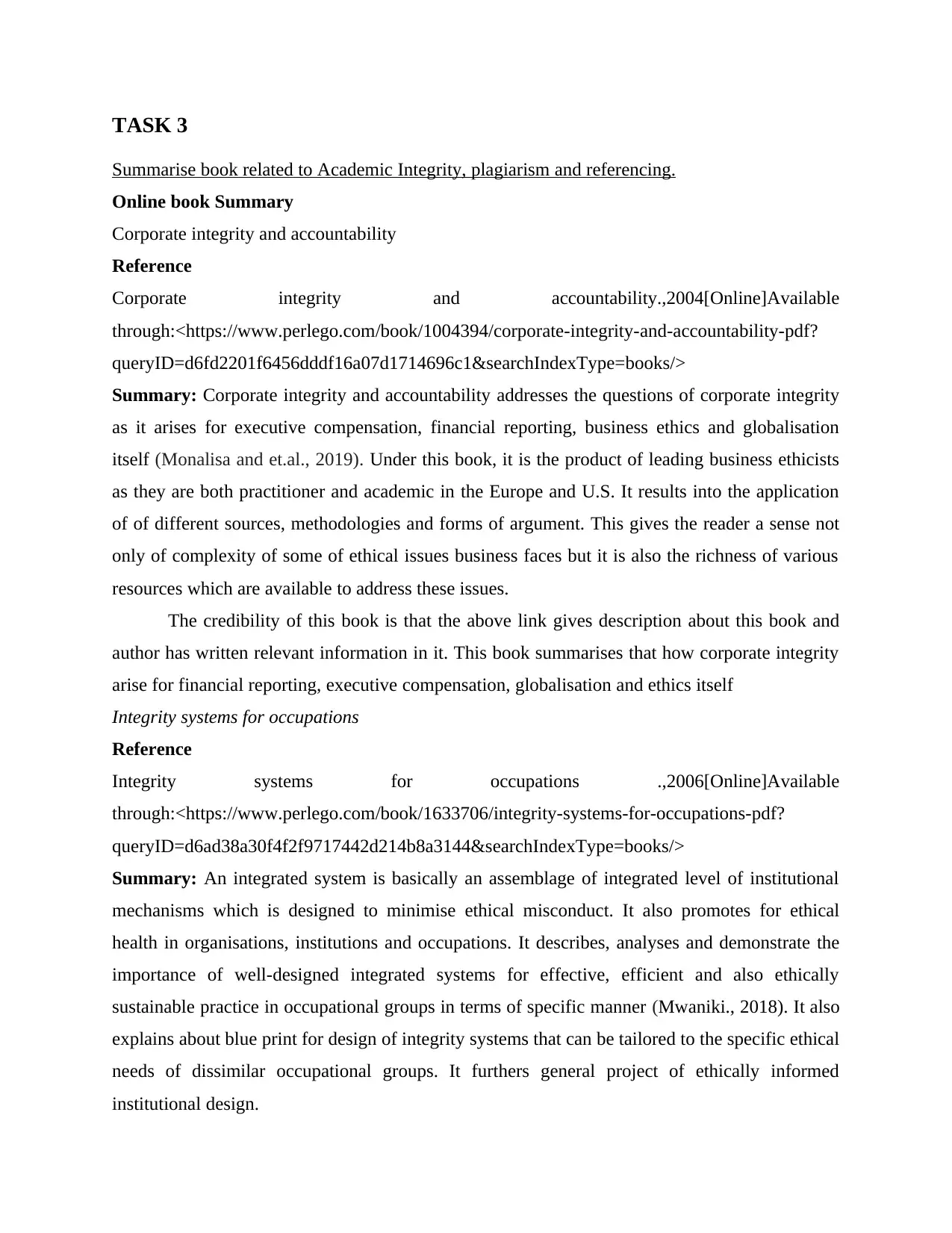
TASK 3
Summarise book related to Academic Integrity, plagiarism and referencing.
Online book Summary
Corporate integrity and accountability
Reference
Corporate integrity and accountability.,2004[Online]Available
through:<https://www.perlego.com/book/1004394/corporate-integrity-and-accountability-pdf?
queryID=d6fd2201f6456dddf16a07d1714696c1&searchIndexType=books/>
Summary: Corporate integrity and accountability addresses the questions of corporate integrity
as it arises for executive compensation, financial reporting, business ethics and globalisation
itself (Monalisa and et.al., 2019). Under this book, it is the product of leading business ethicists
as they are both practitioner and academic in the Europe and U.S. It results into the application
of of different sources, methodologies and forms of argument. This gives the reader a sense not
only of complexity of some of ethical issues business faces but it is also the richness of various
resources which are available to address these issues.
The credibility of this book is that the above link gives description about this book and
author has written relevant information in it. This book summarises that how corporate integrity
arise for financial reporting, executive compensation, globalisation and ethics itself
Integrity systems for occupations
Reference
Integrity systems for occupations .,2006[Online]Available
through:<https://www.perlego.com/book/1633706/integrity-systems-for-occupations-pdf?
queryID=d6ad38a30f4f2f9717442d214b8a3144&searchIndexType=books/>
Summary: An integrated system is basically an assemblage of integrated level of institutional
mechanisms which is designed to minimise ethical misconduct. It also promotes for ethical
health in organisations, institutions and occupations. It describes, analyses and demonstrate the
importance of well-designed integrated systems for effective, efficient and also ethically
sustainable practice in occupational groups in terms of specific manner (Mwaniki., 2018). It also
explains about blue print for design of integrity systems that can be tailored to the specific ethical
needs of dissimilar occupational groups. It furthers general project of ethically informed
institutional design.
Summarise book related to Academic Integrity, plagiarism and referencing.
Online book Summary
Corporate integrity and accountability
Reference
Corporate integrity and accountability.,2004[Online]Available
through:<https://www.perlego.com/book/1004394/corporate-integrity-and-accountability-pdf?
queryID=d6fd2201f6456dddf16a07d1714696c1&searchIndexType=books/>
Summary: Corporate integrity and accountability addresses the questions of corporate integrity
as it arises for executive compensation, financial reporting, business ethics and globalisation
itself (Monalisa and et.al., 2019). Under this book, it is the product of leading business ethicists
as they are both practitioner and academic in the Europe and U.S. It results into the application
of of different sources, methodologies and forms of argument. This gives the reader a sense not
only of complexity of some of ethical issues business faces but it is also the richness of various
resources which are available to address these issues.
The credibility of this book is that the above link gives description about this book and
author has written relevant information in it. This book summarises that how corporate integrity
arise for financial reporting, executive compensation, globalisation and ethics itself
Integrity systems for occupations
Reference
Integrity systems for occupations .,2006[Online]Available
through:<https://www.perlego.com/book/1633706/integrity-systems-for-occupations-pdf?
queryID=d6ad38a30f4f2f9717442d214b8a3144&searchIndexType=books/>
Summary: An integrated system is basically an assemblage of integrated level of institutional
mechanisms which is designed to minimise ethical misconduct. It also promotes for ethical
health in organisations, institutions and occupations. It describes, analyses and demonstrate the
importance of well-designed integrated systems for effective, efficient and also ethically
sustainable practice in occupational groups in terms of specific manner (Mwaniki., 2018). It also
explains about blue print for design of integrity systems that can be tailored to the specific ethical
needs of dissimilar occupational groups. It furthers general project of ethically informed
institutional design.
Paraphrase This Document
Need a fresh take? Get an instant paraphrase of this document with our AI Paraphraser
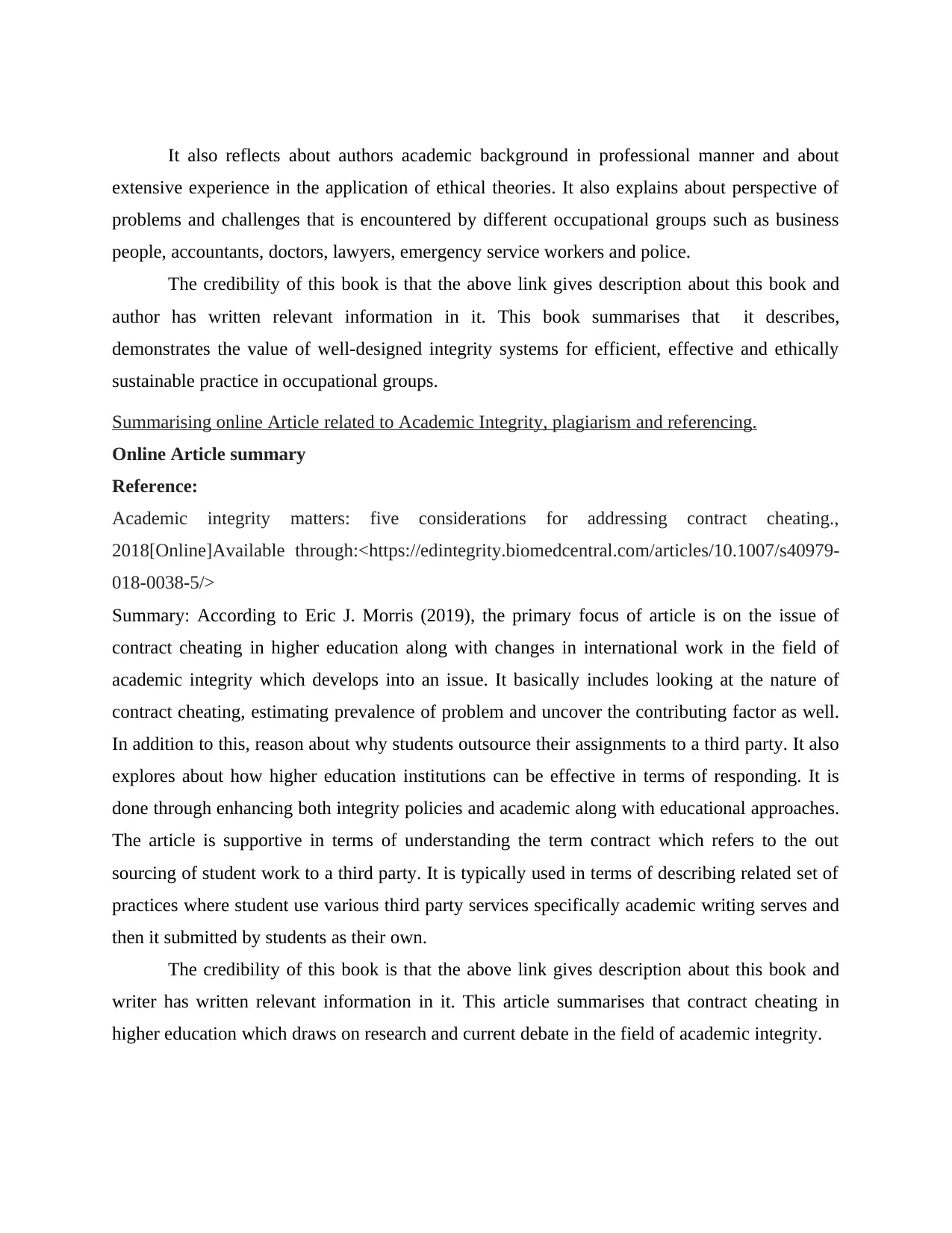
It also reflects about authors academic background in professional manner and about
extensive experience in the application of ethical theories. It also explains about perspective of
problems and challenges that is encountered by different occupational groups such as business
people, accountants, doctors, lawyers, emergency service workers and police.
The credibility of this book is that the above link gives description about this book and
author has written relevant information in it. This book summarises that it describes,
demonstrates the value of well-designed integrity systems for efficient, effective and ethically
sustainable practice in occupational groups.
Summarising online Article related to Academic Integrity, plagiarism and referencing.
Online Article summary
Reference:
Academic integrity matters: five considerations for addressing contract cheating.,
2018[Online]Available through:<https://edintegrity.biomedcentral.com/articles/10.1007/s40979-
018-0038-5/>
Summary: According to Eric J. Morris (2019), the primary focus of article is on the issue of
contract cheating in higher education along with changes in international work in the field of
academic integrity which develops into an issue. It basically includes looking at the nature of
contract cheating, estimating prevalence of problem and uncover the contributing factor as well.
In addition to this, reason about why students outsource their assignments to a third party. It also
explores about how higher education institutions can be effective in terms of responding. It is
done through enhancing both integrity policies and academic along with educational approaches.
The article is supportive in terms of understanding the term contract which refers to the out
sourcing of student work to a third party. It is typically used in terms of describing related set of
practices where student use various third party services specifically academic writing serves and
then it submitted by students as their own.
The credibility of this book is that the above link gives description about this book and
writer has written relevant information in it. This article summarises that contract cheating in
higher education which draws on research and current debate in the field of academic integrity.
extensive experience in the application of ethical theories. It also explains about perspective of
problems and challenges that is encountered by different occupational groups such as business
people, accountants, doctors, lawyers, emergency service workers and police.
The credibility of this book is that the above link gives description about this book and
author has written relevant information in it. This book summarises that it describes,
demonstrates the value of well-designed integrity systems for efficient, effective and ethically
sustainable practice in occupational groups.
Summarising online Article related to Academic Integrity, plagiarism and referencing.
Online Article summary
Reference:
Academic integrity matters: five considerations for addressing contract cheating.,
2018[Online]Available through:<https://edintegrity.biomedcentral.com/articles/10.1007/s40979-
018-0038-5/>
Summary: According to Eric J. Morris (2019), the primary focus of article is on the issue of
contract cheating in higher education along with changes in international work in the field of
academic integrity which develops into an issue. It basically includes looking at the nature of
contract cheating, estimating prevalence of problem and uncover the contributing factor as well.
In addition to this, reason about why students outsource their assignments to a third party. It also
explores about how higher education institutions can be effective in terms of responding. It is
done through enhancing both integrity policies and academic along with educational approaches.
The article is supportive in terms of understanding the term contract which refers to the out
sourcing of student work to a third party. It is typically used in terms of describing related set of
practices where student use various third party services specifically academic writing serves and
then it submitted by students as their own.
The credibility of this book is that the above link gives description about this book and
writer has written relevant information in it. This article summarises that contract cheating in
higher education which draws on research and current debate in the field of academic integrity.
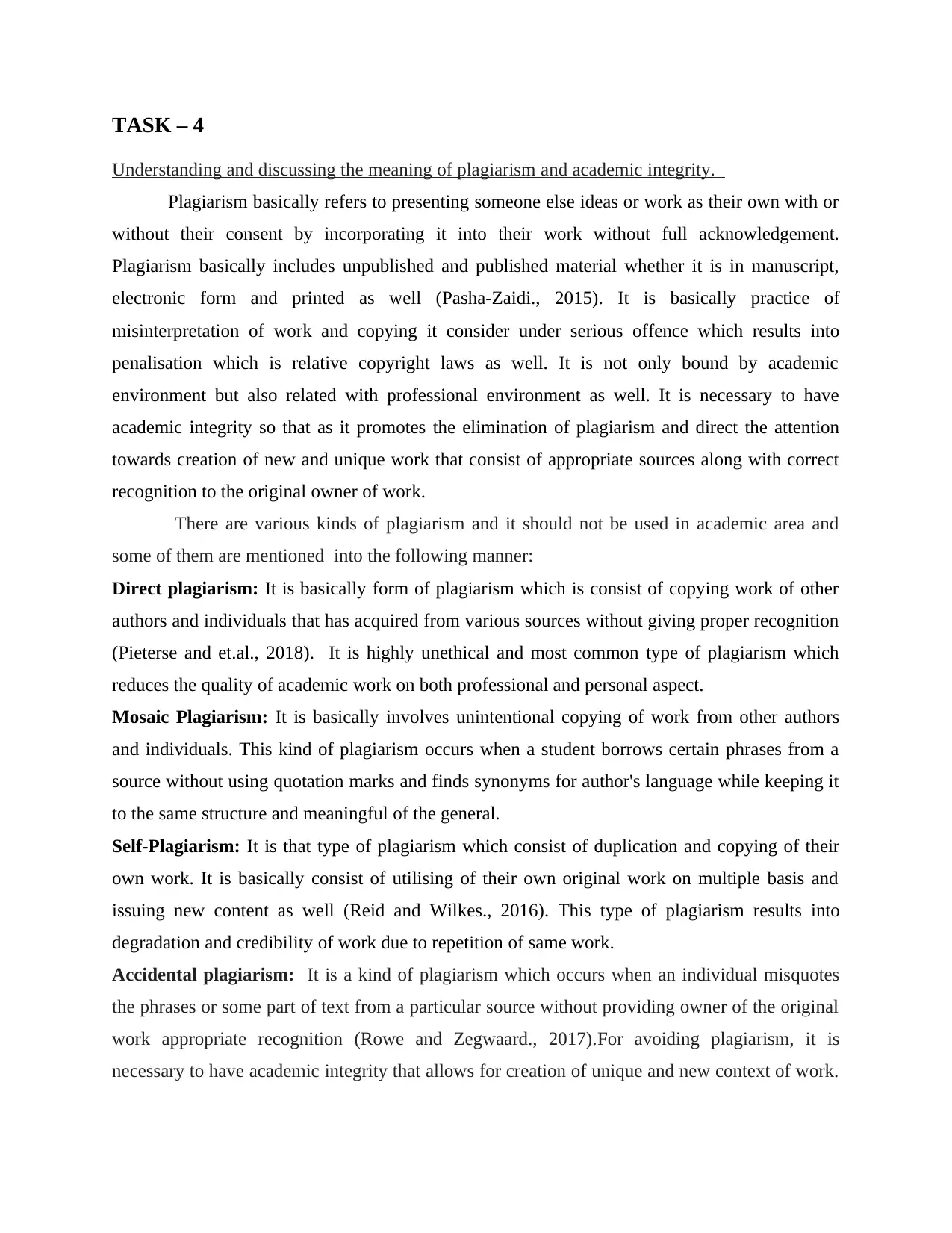
TASK – 4
Understanding and discussing the meaning of plagiarism and academic integrity.
Plagiarism basically refers to presenting someone else ideas or work as their own with or
without their consent by incorporating it into their work without full acknowledgement.
Plagiarism basically includes unpublished and published material whether it is in manuscript,
electronic form and printed as well (Pasha-Zaidi., 2015). It is basically practice of
misinterpretation of work and copying it consider under serious offence which results into
penalisation which is relative copyright laws as well. It is not only bound by academic
environment but also related with professional environment as well. It is necessary to have
academic integrity so that as it promotes the elimination of plagiarism and direct the attention
towards creation of new and unique work that consist of appropriate sources along with correct
recognition to the original owner of work.
There are various kinds of plagiarism and it should not be used in academic area and
some of them are mentioned into the following manner:
Direct plagiarism: It is basically form of plagiarism which is consist of copying work of other
authors and individuals that has acquired from various sources without giving proper recognition
(Pieterse and et.al., 2018). It is highly unethical and most common type of plagiarism which
reduces the quality of academic work on both professional and personal aspect.
Mosaic Plagiarism: It is basically involves unintentional copying of work from other authors
and individuals. This kind of plagiarism occurs when a student borrows certain phrases from a
source without using quotation marks and finds synonyms for author's language while keeping it
to the same structure and meaningful of the general.
Self-Plagiarism: It is that type of plagiarism which consist of duplication and copying of their
own work. It is basically consist of utilising of their own original work on multiple basis and
issuing new content as well (Reid and Wilkes., 2016). This type of plagiarism results into
degradation and credibility of work due to repetition of same work.
Accidental plagiarism: It is a kind of plagiarism which occurs when an individual misquotes
the phrases or some part of text from a particular source without providing owner of the original
work appropriate recognition (Rowe and Zegwaard., 2017).For avoiding plagiarism, it is
necessary to have academic integrity that allows for creation of unique and new context of work.
Understanding and discussing the meaning of plagiarism and academic integrity.
Plagiarism basically refers to presenting someone else ideas or work as their own with or
without their consent by incorporating it into their work without full acknowledgement.
Plagiarism basically includes unpublished and published material whether it is in manuscript,
electronic form and printed as well (Pasha-Zaidi., 2015). It is basically practice of
misinterpretation of work and copying it consider under serious offence which results into
penalisation which is relative copyright laws as well. It is not only bound by academic
environment but also related with professional environment as well. It is necessary to have
academic integrity so that as it promotes the elimination of plagiarism and direct the attention
towards creation of new and unique work that consist of appropriate sources along with correct
recognition to the original owner of work.
There are various kinds of plagiarism and it should not be used in academic area and
some of them are mentioned into the following manner:
Direct plagiarism: It is basically form of plagiarism which is consist of copying work of other
authors and individuals that has acquired from various sources without giving proper recognition
(Pieterse and et.al., 2018). It is highly unethical and most common type of plagiarism which
reduces the quality of academic work on both professional and personal aspect.
Mosaic Plagiarism: It is basically involves unintentional copying of work from other authors
and individuals. This kind of plagiarism occurs when a student borrows certain phrases from a
source without using quotation marks and finds synonyms for author's language while keeping it
to the same structure and meaningful of the general.
Self-Plagiarism: It is that type of plagiarism which consist of duplication and copying of their
own work. It is basically consist of utilising of their own original work on multiple basis and
issuing new content as well (Reid and Wilkes., 2016). This type of plagiarism results into
degradation and credibility of work due to repetition of same work.
Accidental plagiarism: It is a kind of plagiarism which occurs when an individual misquotes
the phrases or some part of text from a particular source without providing owner of the original
work appropriate recognition (Rowe and Zegwaard., 2017).For avoiding plagiarism, it is
necessary to have academic integrity that allows for creation of unique and new context of work.
⊘ This is a preview!⊘
Do you want full access?
Subscribe today to unlock all pages.

Trusted by 1+ million students worldwide
1 out of 18
Related Documents
Your All-in-One AI-Powered Toolkit for Academic Success.
+13062052269
info@desklib.com
Available 24*7 on WhatsApp / Email
![[object Object]](/_next/static/media/star-bottom.7253800d.svg)
Unlock your academic potential
Copyright © 2020–2026 A2Z Services. All Rights Reserved. Developed and managed by ZUCOL.

